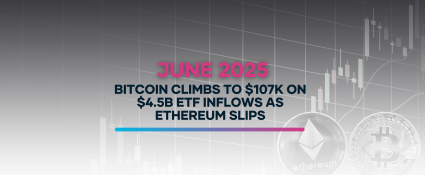Bitcoin Price: US$19,439.02 (+0.11%)
Ethereum Price: US$ 1,323.13 (+0.58%)
Short-Term Relief, or Continued Downside? -VIDEO
- In this week’s edition of Market Insights, we take a slightly different approach. This week, we invite subscribers to a different format, one in which we have a conversation discussing some of the big events that are top of mind within both traditional and crypto markets.
- The topics that we discuss this week include:
- CPI expectations heading into next week
- DXY top or consolidation?
- What role does seasonality play here and what does history show us?
- Relative strength within crypto markets
- How are public pensions doing?
- Whatt to make of the disappearing spot bid?
- Continue on Delphi…
Bitcoin drops below $20,000 following U.S. jobs data; DXY dollar index soars
- Crypto prices plummeted following the lowest monthly job figures out of the U.S. since last December.
- The U.S. added 263,000 new jobs in month of September, above expectations of 255,000 and below the previous month, when 315,000 jobs were added. Bitcoin dropped below $20,000 following the news, losing about 2% in the last hour to trade at $19,623, according to data via Coinbase.
- The U.S. non-farm payrolls are released on the first Friday of every month as part of the employment situation report, and measure the number of new jobs in the U.S., excluding farm workers and several other job categories. The unemployment rate fell to 3.5%, below expectations of 3.7%, according to todays report.
- The DXY Dollar index, which measures of the value of the U.S. dollar relative to a basket of foreign currencies, rose immediately after the release.
Lido launches support for staked ETH on Layer 2 integrations
- Leading staking service provider Lido will now support the bridging of assets to Layer 2 protocols, it announced on Twitter.
- Lido allows users to stake ETH and receive staked ETH (stETH) in return. The new changes to Lido introduced wrapped staked ETH (wstETH), a token that can be bridged to Layer 2 networks Arbitrum One and Optimism, and that will accommodate ease of integration across DeFi partners while preserving the unique properties of stETH, according to Lido. Guides are offered to users, with instructions on how to wrap stETH for wstETH.
- To incentivize participation, on Oct. 7, 150,000 LDO tokens will be allocated on a monthly basis to fuel wsETH rewards across partner networks, beginning with mining liquidity incentives across DeFi platforms including Beethoven X, Balancer, Curve Finance, Kyber Network and Velodrome.
Valkyrie Funds, Ark Invest Say Crypto Has Hit ‘Bottom’ Amid Recession Woes
- On Friday the Labor Department reported U.S. job growth rose by 263,000 during September, which was better than expected but still lower than August’s 315,000 additional jobs.
- So does the decrease in new jobs signal a change in Federal Reserve thinking, and how would that affect cryptocurrencies?
- Asset managers, from Ark Invest and Valkyrie see crypto as having hit bottom, meaning it can go no lower in price, at a time when the Federal Reserve’s “tug-of-war” with the global macro environment could lead to continued interest rate hikes.
- “Whether the Federal Reserve oversteps and makes a policy mistake, we’re essentially pricing in a recession,” Frank Downing, director of research at Ark Invest, said on CoinDesk TV’s “First Mover” on Friday.
Solana Co-Founder Says ‘Long-Term Fix’ to Network Outages Is in the Works
- Solana co-founder Anatoly Yakovenko knows that Solana’s outages concern its users. But a solution for the network could be on the horizon.
- “This has been the biggest challenge for us, and the number one priority,” Yakovenko told Decrypt on the most recent episode of the gm podcast.
- The young proof-of-history, proof-of-stake hybrid blockchain has had five major outages since its launch in 2020. Out of those five, three have occurred this year—each one the result of either bugs in Solana’s code or the network becoming overwhelmed by artificial traffic from bots.
Has Proof of Stake Made Ethereum More Centralized?
- With its shift from proof of work to proof of stake last month, Ethereum now relies on validators, not miners, to add new transactions to the network. Those validators get to decide what transactions go into each block and in what order. Although that’s already lowered the energy consumption of the network by 99.99%, it also means that a large portion of the ETH securing the network sits with centralized entities.
- That runs counter to all the reasons Ethereum was made to be decentralized in the first place, critics say. Blockchain networks aren’t supposed to be at the whims of powerful, central entities.
- As of last month, 13.5 million ETH (worth $22.3 billion at the time) had been staked on the Ethereum network, with more than 60% of that ETH sitting with Lido Finance, Coinbase, Kraken, and Binance. That means these centralized entities have a much higher likelihood of being assigned blocks of transactions to add to the chain—and may end up having an outsized say-so in what is and isn’t allowed on the network.











